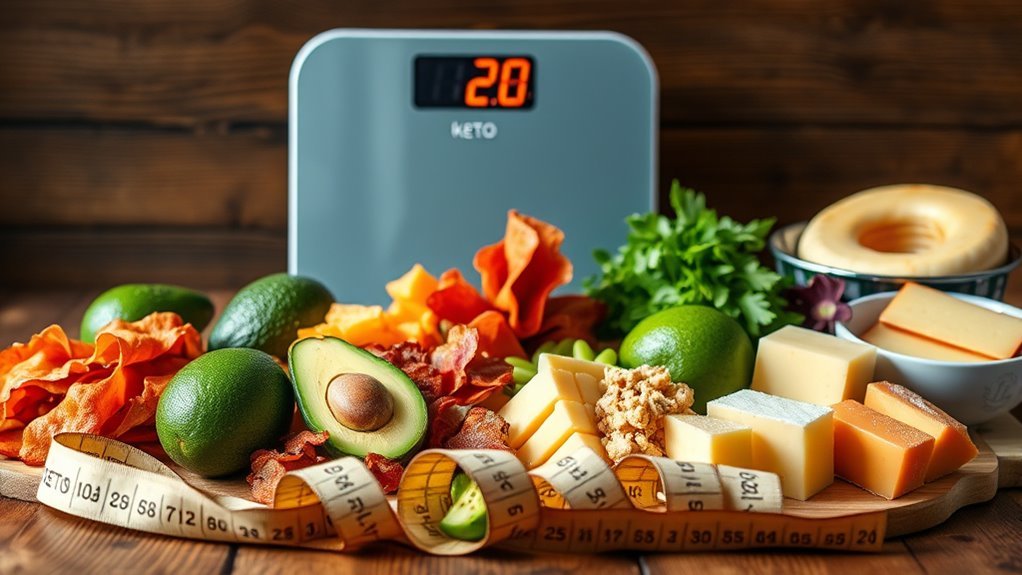On the ketogenic diet, you can expect to lose 2-10 pounds in the first week due to water loss, followed by a steady pace of 1-2 pounds per week thereafter. Factors like your metabolic rate and diet adherence can influence your results. With consistent effort, many see a significant transformation in 2-3 months. To maximize your success, there are key strategies you can implement, so keep exploring for additional insights.
Understanding the Ketogenic Diet

Understanding the ketogenic diet can be vital for anyone looking to lose weight effectively. This diet emphasizes specific macronutrient ratios, typically around 70% fat, 25% protein, and 5% carbohydrates. By considerably reducing carbs, you trigger the ketosis process, where your body shifts from burning glucose to burning fat for energy. This metabolic state not only helps in weight loss but can also lead to increased mental clarity and energy levels. It’s important to monitor your macronutrient intake to maintain ketosis, ensuring you’re fueling your body properly while shedding pounds. Embracing this structured yet liberating approach allows you to enjoy a variety of foods while achieving your weight loss goals. With the right knowledge, you can navigate this journey successfully.
Factors Influencing Weight Loss on Keto

While you may be enthusiastic to see rapid results on the ketogenic diet, several factors can considerably influence your weight loss journey. Understanding these factors can help you navigate your path more effectively. Here are three key influences:
Several factors influence your weight loss journey on the ketogenic diet, making understanding them crucial for success.
- Metabolic Rate: Your unique metabolic rate plays an important role in how quickly you burn calories. A higher metabolic rate can lead to faster weight loss.
- Individual Variance: Everyone’s body reacts differently to the keto diet. Factors like genetics and hormonal balance can affect your progress.
- Diet Adherence: Sticking to the keto plan consistently is essential. Occasional slip-ups can stall your weight loss efforts.
Typical Weight Loss Timeline

When starting a ketogenic diet, many people wonder what kind of timeline to expect for weight loss. Typically, you might experience initial weight loss within the first week due to water loss and glycogen depletion. As you settle into the diet, steady fat loss usually occurs, often ranging from 1-2 pounds per week. For long-term results, it’s essential to maintain consistency and assess your progress over a few months.
| Week | Expected Weight Loss |
|---|---|
| 1 | 2-10 pounds (initial loss) |
| 2-4 | 1-2 pounds per week |
| 4-8 | 1-2 pounds per week |
| 2-3 months | 5-15% of body weight |
| 3+ months | Continued gradual loss |
Tips for Maximizing Your Keto Results
To maximize your results on the ketogenic diet, focusing on a few key strategies can make a significant difference. Here are three tips to enhance your keto journey:
Maximize your ketogenic diet success by implementing key strategies like meal prepping, carb cycling, and staying hydrated.
- Meal Prepping: Plan and prepare your meals ahead of time. This helps you stick to your macros and avoids the temptation of carb-rich foods when hunger strikes.
- Incorporate Carb Cycling: Occasionally increase your carb intake to recharge your metabolism. This approach can prevent plateaus and maintain energy levels during workouts.
- Stay Hydrated: Drinking enough water supports overall health and can help with weight loss. It also aids in reducing keto flu symptoms.
Maintaining Weight Loss After Keto
Maintaining weight loss after following a ketogenic diet can be challenging, especially as your body adjusts to a higher carbohydrate intake. To guarantee long-term success, you’ll need effective keto maintenance strategies. Start by gradually reintroducing carbs while monitoring your body’s response. Focus on whole, nutrient-dense foods to prevent cravings and maintain satiety. Incorporate regular physical activity to help manage weight and enhance your overall well-being.
Tracking your meals can also be beneficial; it keeps you accountable and aware of what you’re consuming. Finally, prioritize hydration and sleep, as both play significant roles in weight management. Remember, finding balance is key; it’s about enjoying food freedom while staying mindful of your health goals.
Frequently Asked Questions about Weight Loss on Keto
1. How long does it typically take to start losing weight on a ketogenic diet?
Most people begin to lose weight within the first week of starting a ketogenic diet. Initial weight loss is often due to the loss of water weight as the body depletes its glycogen stores. After the first week, weight loss may slow down but can continue at a steady pace of about 1-2 pounds per week, depending on individual metabolism and adherence to the diet.
2. What factors influence how quickly someone loses weight on keto?
Several factors can influence weight loss on a ketogenic diet, including age, gender, starting weight, metabolic rate, level of physical activity, and adherence to the diet. Additionally, how strictly one follows the macronutrient ratios of high fat, moderate protein, and low carbohydrates can significantly affect weight loss speed.
3. Is it possible to hit a weight loss plateau on the keto diet?
Yes, many individuals experience a weight loss plateau after several weeks or months on the keto diet. This can happen due to metabolic adaptations, where the body becomes more efficient at using fewer calories or due to an increase in muscle mass. To overcome a plateau, individuals may need to reassess their caloric intake, adjust their macronutrient ratios, or incorporate more physical activity.
4. How much weight can I realistically expect to lose in a month on keto?
On average, individuals may lose about 4-10 pounds in the first month on a ketogenic diet, with a more sustainable rate of 1-2 pounds per week thereafter. However, results can vary widely based on personal factors such as adherence to the diet, starting weight, and individual metabolism. It is essential to set realistic goals and focus on overall health rather than just the number on the scale.
5. Why is the initial weight loss on keto often so dramatic?
The initial weight loss on the ketogenic diet can be dramatic primarily due to water weight. When carbohydrate intake is significantly reduced, the body uses stored glycogen for energy, which is bound to water (approximately 3-4 grams of water for every gram of glycogen). As glycogen stores are depleted, this water is released, leading to rapid weight loss in the first week. Once the body adapts to ketosis, the weight loss pace typically stabilizes.
References
- https://www.ncbi.nlm.nih.gov/pmc/articles/PMC8022085/
- https://www.cdc.gov/healthyweight/losing_weight/index.html
- https://www.hhs.gov/fitness/eat-healthy/what-is-a-ketogenic-diet.html
- https://www.health.harvard.edu/staying-healthy/the-ketogenic-diet
- https://www.verywellfit.com/keto-diet-weight-loss-5195967
- https://www.webmd.com/diet/what-is-the-keto-diet
- https://www.journals.elsevier.com/nutrition
- https://www.nhlbi.nih.gov/health/educational/lose_wt/index.htm


